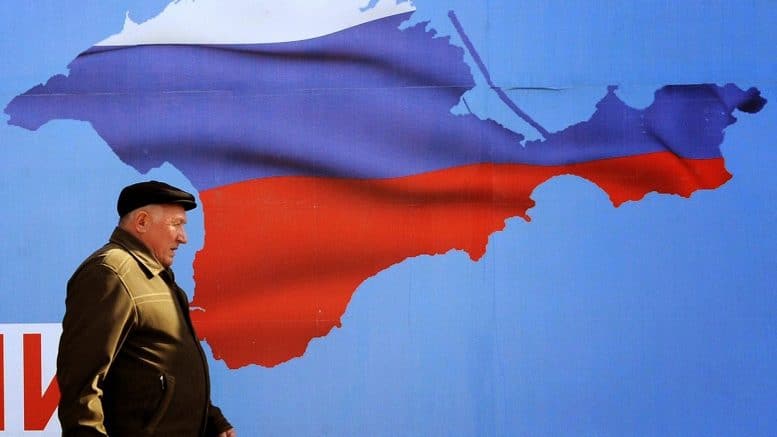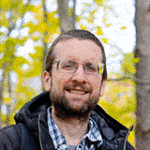The day before Crimea voted in its independence referendum, The Village, a Moscow-based publication with editions in St. Petersburg and Kiev, asked residents of various Ukrainian cities to report on what is happening locally for them. The original article, in Russian by Evgenii Safonov, can be found on their site here.
 Kherson
Kherson
Vladislav Gladkii
Director of the “Center for the Promotion of Information Technology”
Kherson is daily enveloped in smoke from the burning floodplains. People worried about their dachas along the Dnieper River check to see if they are on fire. In our local Maidan square, about two hundred people gather regularly to listen to announcements from the governor Kiev has newly appointed about what’s to come and about how the situation is under control. There’s no panic. But, tension is building as rumors circulate that the Russians have plans to capture the Kakhovskaya hydroelectric station or the helicopter division in Chernovaevka. Local technicians have repaired the web cameras on Independence Square and now watch online for crowds of people. Yesterday, on the streets, people passed out pamphlets, calling for citizens to join the national guard and defend Kherson. An acquaintance of mine helps with military recruitment and delivers orders. Training sessions for the guard have been extended to March 20.
**Note: floodplains occasionally burn. The fires around Kherson are not directly related with the recent political upheval in Ukraine.
 Kharkov
Kharkov
Ivan Kisli
Journalist
In Kharkov, the Crimea question has fallen to the wayside in the last few days. Important local figures, such as former governor Mikhail Dobkin and mayor Henadii Kernes, are under house arrest. And, if the fate of such a boring person as Dobkin doesn’t worry the public too much, a few thousand people have gathered on the local square in support of Kernes, almost all voluntarily. Everyone that I know, including myself, has been receiving calls from relatives in Russia, telling us to pack up and flee the carnage in the streets. We calmly explain that all suitcases are put away and that fascist thugs exist only in the Russian media. They listen as if they agree, but it’s clear, that they don’t really believe us — Russia Channel doesn’t lie. Nobody knows what will happen on Sunday (when the referendum is held).
 Feodosia
Feodosia
Alexei Baturin
Journalist
The mood has changed a little bit. Of course, on the streets, in public transportation, in the stores—everywhere you hear the word “referendum,” and many people are preparing to “vote for Russia,” but there were other reasons for conversation. Citizens wait for the spectacle: Nikolai Baluev came to Fedosia and will lead a meeting in the House of Culture. On the main square of the city, they are assembling a stage, which will hold a concert with Russian stars. The weather is warm and spring-like, and because of the great weather, a full house is expected for the concert. The city is decorated with posters of Russian symbols, and many small Russian flags are hung from cars. On the central boulevard, we’re repeatedly reminded that “Russia loves Crimea.” To protect the citizens from the opposing view, the local authorities decided to stop showing Ukrainian channels during the referendum. Far from everyone approved of this decision, because peoples’ favorite series and shows were turned off in addition to “enemy” news.
There have been reports that a convoy of military equipment passed through the city towards the north – with trucks mounted with artillery. Few people have paid attention. It’s possible, many are simply already sick of worrying, as the emotions from the last few days were obviously too much.
An acquaintance called and said that Sunday night, he bought a ticket to Kiev, since he expects nothing good to come from Crimea. But this isn’t typical. The mood of the majority is noticeably high, because most are confident that Crimea will become part of Russia and that this will help Crimea.
 Berdyansk
Berdyansk
Valeria Buchanova
Journalist
Right now, regardless of their political views, locals here are first of all afraid of war and poverty. Many do not like what has happened at Maidan. People are afraid of the arrival of fascist Banderites and do not approve of the new government. Also, some aren’t totally against joining Russia—but only without war. Since Berdyansk is a port city, it is strategically important. Uncertainty scares people, and many have started stocking food taking out even whatever minimal savings they may have. Grandmothers worry that their pensions will be delayed and subsidies will be cancelled. An acquaintance told me that in the fall they decided not to plant potatoes at the dacha because they’re only worth pennies, but now, they have decided to plant twice as many as usual because “you never know.” Still many worry that the holiday season will be shortened, and it’s well known that many citizens live off of the tourism. What worries people less than anything are presidential elections.
 Dnepropetrovsk
Dnepropetrovsk
Lyosha Baida
IT Specialist
In light of recent events, Kolomoski (the oligarch who was appointed governor of the Dnepropetrovsk Region) held a three-hour meeting at the city administration and ordered that all military equipment be re-fueled. Intellectuals are discussing who of them are already ready to take up arms and who will go, if necessary.
My brother-in-law has already been called up, which worries my sister and mother. The reserve officers I know and paintball fanatics who’ve learned to calmly shoot weapons are preparing for the worst-case scenario. Panic among Russian-speakers who say the fascist Banderites will come slaughter us has also ended. The Russian channels in the city have been turned off. It’s true, part of the female audience is sad that they can’t watch their favorite serials anymore. But who is really sad in Dnepropetrovsk are the small business owners — deliveries to Crimea have stopped, the losses will add up.
 Donetsk
Donetsk
Katerina
Linguist
Protests supporting a unified Ukraine have been attended mostly by local intellectuals. Attending such events, as shown by recent events, is life-threatening. Several people I know are afraid now to simply look intelligent, as “they may be taken for fascist Banderites.” Today, some acquaintances were seriously talking about the need to dress up as thugs—leather jackets, athletic pants, skull caps, deep voices. Meanwhile, something like a mass enlightenment is occurring. The taxi driver unwittingly speaks the words of philosopher Lao Tzu: «Do what is necessary, come what may. Everything will follow its course. And what is this? Why resist what can be seen in the mirror?» The world finds artistic elements of Kafka’s novels, but what to do with such Kafka-ness, nobody remembers.
 Kiev
Kiev
Evgenii Safonov
Journalist
My mom calls this a deceitful warming—the sun is shining, but it’s still cool. One person might wear a light jacket, another is in shorts and a t-shirt. The season of riding bicycles, wearing miniskirts, and sitting in squares has begun. With that, three new cafes opened in the center. At the same time, on television people talk about Russian C-300 air-defense systems in Crimea. There are inevitable jokes that they too (like the unmarked uniforms that Vladimir Putin says can be bought anywhere) were purchased at the store. My father, a retired officer, visited me but left earlier than expected because he was asked to appear at the recruitment office in Kherson. Many wonder where to leave their kids. By the way, my child is already been affected by the war – his favorite cartoons were turned off with the Russian channels in this city. I’ve wondered as well how everything is going in the world of Lupdid, Leon the Cub, and The Bears from the Country of Goodness.










